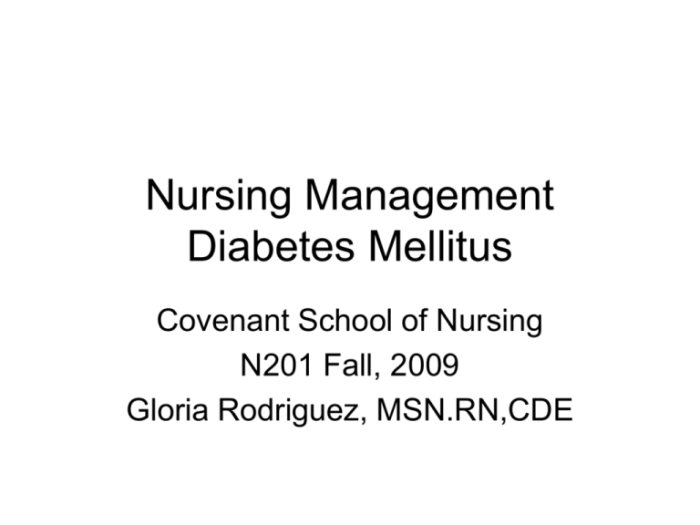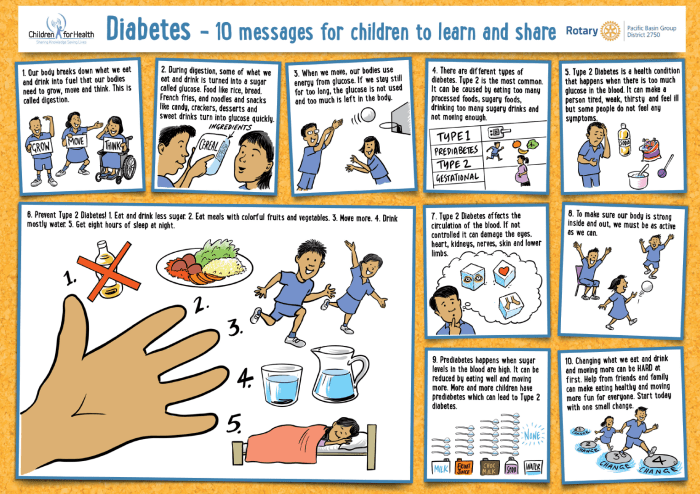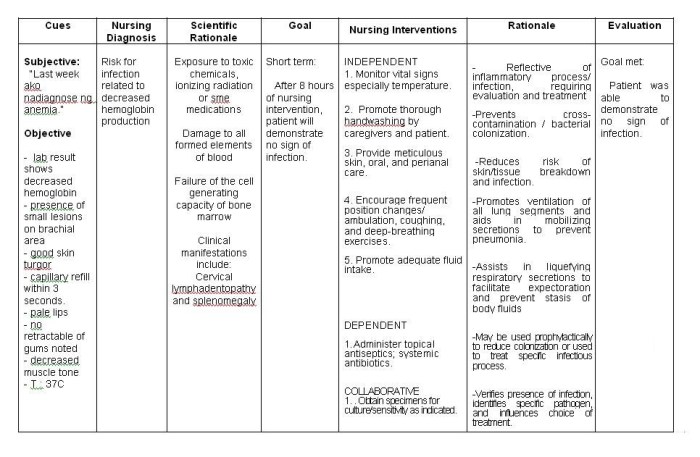A nurse is planning a community diabetes mellitus management program, an ambitious undertaking that aims to improve the health outcomes of individuals living with diabetes in the community. This program will provide comprehensive care, including education, support, and lifestyle interventions, tailored to the specific needs of the target population.
Diabetes mellitus is a chronic disease that affects millions of people worldwide. It is characterized by elevated blood glucose levels, which can lead to a variety of complications, including heart disease, stroke, kidney failure, and blindness. The management of diabetes requires a multidisciplinary approach, involving healthcare professionals, patients, and their families.
Nurses play a vital role in providing education, support, and care to individuals with diabetes.
Program Overview: A Nurse Is Planning A Community Diabetes Mellitus Management Program

The community diabetes mellitus management program aims to improve the health outcomes of individuals living with diabetes in the target community. Its objectives include:
- Providing comprehensive education on diabetes management
- Offering support groups for emotional and social support
- Promoting lifestyle interventions to improve blood glucose control and overall well-being
The program targets individuals with type 2 diabetes who are at risk for complications or who are struggling to manage their condition effectively.
Program Design
The program comprises three key components:
- Education:Interactive sessions covering topics such as diabetes management, nutrition, medication use, and lifestyle modifications.
- Support Groups:Facilitated by trained peer mentors, these groups provide a safe and supportive environment for participants to share experiences, offer encouragement, and learn from one another.
- Lifestyle Interventions:Tailored exercise programs, nutrition counseling, and stress management techniques to promote healthy behaviors and improve blood glucose control.
These components are aligned with the program’s objectives to empower participants with knowledge, support, and practical strategies for managing their diabetes.
Implementation Plan, A nurse is planning a community diabetes mellitus management program
The program will be implemented in three phases:
- Phase 1 (Planning):Developing program materials, recruiting participants, and establishing partnerships with local healthcare providers and community organizations.
- Phase 2 (Implementation):Launching the education sessions, support groups, and lifestyle interventions.
- Phase 3 (Evaluation and Refinement):Collecting data to evaluate program effectiveness and making necessary adjustments to improve outcomes.
Participants will be recruited through outreach events, community health centers, and referrals from healthcare providers. Strategies for ensuring engagement include flexible scheduling, transportation assistance, and incentives for participation.
Evaluation Plan
The program’s effectiveness will be evaluated using a mixed-methods approach:
- Quantitative Measures:Changes in HbA1c levels, medication adherence, and lifestyle behaviors.
- Qualitative Measures:Participant satisfaction surveys, focus groups, and interviews to assess the program’s impact on knowledge, self-efficacy, and well-being.
- Funding Diversification:Securing funding from multiple sources, including grants, partnerships, and community fundraising.
- Community Partnerships:Collaborating with local organizations, such as faith-based groups, senior centers, and YMCA/YWCA, to provide ongoing support and resources to participants.
- Integration into Healthcare System:Establishing referral pathways with local healthcare providers to ensure seamless transitions of care.
Data will be collected at baseline, 6 months, and 12 months post-intervention. The evaluation results will be used to identify areas for improvement and enhance the program’s effectiveness over time.
Sustainability Plan
To ensure the program’s long-term sustainability, several strategies will be implemented:
By adopting these strategies, the program aims to become an integral part of the community healthcare system, providing ongoing support and resources to individuals living with diabetes.
Answers to Common Questions
What are the goals of the community diabetes mellitus management program?
The goals of the program are to improve the health outcomes of individuals living with diabetes in the community by providing comprehensive care, including education, support, and lifestyle interventions.
Who is the target population for the program?
The target population for the program is individuals living with diabetes in the community.
What services will the program provide?
The program will provide a range of services, including education, support, and lifestyle interventions, tailored to the specific needs of the target population.
How will the program be evaluated?
The program will be evaluated on an ongoing basis to ensure that it is meeting its objectives and improving the health of the community.

